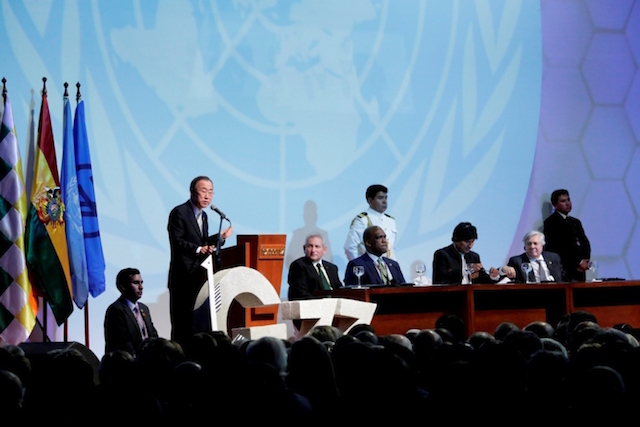By J Nastranis | IDN-InDepthNews Report
NEW YORK (IDN) – UN Secretary-General Ban Ki-moon commended the role played by ‘Group of 77’ (G77) developing countries and China, comprising 134 out of 193 member states of the United Nations, “in cementing historic 2015 successes”, as South Africa handed over Chair to Thailand on January 12.
At the handover ceremony of the Group’s Chairmanship, Ban expressed appreciation for South Africa’s “able stewardship as the Chair of the Group of 77 and China throughout such a historic year for multilateralism”, and warmly welcomed Thailand’s leadership.
The year 2015 marked a turning point in our efforts to safeguard our planet and build a world of peace and sustainable prosperity for all, declared Ban. “The Group of 77 and China can look back with great pride.” The 2030 Agenda for Sustainable Development was “guide to a better world, captured in 17 goals”.
The UN head described the Addis Ababa Action Agenda emerging from the Financing for Development Conference in July 2015 “an ambitious and strong agreement on the mobilization of resources, technology and the global partnership needed for sustainable development”.
The Paris Agreement on climate change, he said, is a triumph of multilateralism, which can benefit all of humanity for generations to come. “I will continue to advocate for more attention and resources to be directed towards the poorest and most vulnerable, who are suffering most from the increasing impacts of climate change.”
None of these historic outcomes would have been achieved without “the commitment and leadership” of the G 77 and China. “You worked to forge consensus. You scaled up ambition. You have helped redefine development. Now, our attention must shift to implementation. This year offers several strategic opportunities to chart the course of implementation.”
Ban said he is finalizing his report on the follow-up of Agenda 2030, adding: “I have all the confidence that, together, we will ensure coherent and effective methods for follow-up and review. The centrepiece is the High-Level Political Forum (HLPF) under the auspices of ECOSOC [Economic and Social Council] and the General Assembly.”
The HLPF in July 2016 will discuss the follow-up and review processes at the global, regional and national levels to bolster implementation of the new Agenda.
In this regard, he said, funding will be critical and we will have a number of opportunities to mobilize resources. These include: the inaugural ECOSOC Financing for Development Forum; the first Multistakeholder Forum on Science, Technology and Innovation; and the ECOSOC Development Cooperation Forum.
Furthermore, as a first step in implementing the Paris Agreement, a signing ceremony will take place in New York on April 22. Ban invited Governments to attend “this momentous event at the highest level to maintain strong political momentum on climate change and to facilitate the early entry into force of the Agreement”.
Alongside these signal efforts, Ban is looking forward to the next Quadrennial Comprehensive Policy Review of United Nations operational activities for development. The G77 and China has always played a leading role in this regard, the UN head said.
In 2016 there are heightened expectations for the directions the United Nations development system can take to support Agenda 2030, said Ban adding that he counts on the commitment and support of the G77 and China, under the able leadership of Thailand, to make these processes a success.
“The test for success will always remain what happens on the ground. We need to get this right so that our operational and normative work can converge and make a difference where it matters most — at the country level.”
The G77 was established on June 15, 1964 by 77 developing countries signatories of the ‘Joint Declaration of the Seventy-Seven Developing Countries’ issued at the end of the first session of the United Nations Conference on Trade and Development (UNCTAD) in Geneva.
Beginning with the first “Ministerial Meeting of the Group of 77 in Algiers (Algeria) from October 10 to 25, 1967, which adopted the ‘Charter of Algiers’, a permanent institutional structure gradually developed which led to the creation of Chapters of the Group of 77 with Liaison offices in Geneva (UNCTAD), Nairobi (UNEP), Paris (UNESCO), Rome (FAO/IFAD), Vienna (UNIDO), and the Group of 24 (G-24) in Washington, D.C. (IMF and World Bank). Although the members of the G-77 have increased to 134 countries, the original name was retained due to its historic significance. [IDN-InDepthNews – 13 January 2016]
Photo: UN Secretary-General Ban Ki-moon addressing a summit of G77 plus China in Santa Cruz, Bolivia in 2014. UN Photo/Evan Schneider
2016 IDN-InDepthNews | Analysis That Matters
IDN is the flagship of International Press Syndicate.
Send your comment | Subscribe to IDN newsletter
Follow us on Twitter and Facebook:
http://twitter.com/InDepthNews
http://www.facebook.com/IDN.GoingDeeper

